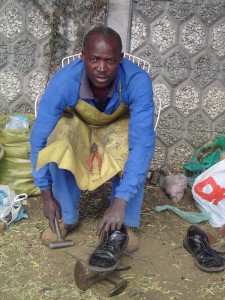So there’s this thing that we Africans do that is a little bit funny, but also actually quite a serious issue.
Let me set the secenario for you by introducing you to the imaginary Mr. Y and his wife, Mrs. Y who will help me illustrate my point.
The Ys are a family who earn enough money from their combined salaries just to get by each month, as well as take care of their three young children. Mr. Y works with an NGO where his pay is lukewarm, and Mrs. Y is a nurse in a public hospital. Her pay is definitely cold.
So you would think that the Ys try by all means to live within their means right?
Far from it!
Rather, they rent out a house in some plush suburb (though they are three months behind on paying up and the landlord is threatening to take them to court) and their children go to that private school up the rolling highlands where the red-hot fees ensure that Mr. Y can never save enough money to fix that dent on the bonnet of his car.
Speaking of his car, Mr. Y drives a C Class Benz – black in colour, tinted windows with reams gleaming that seem to make time slow down with each revolution of the fine specimen’s tyres.
Oh, and doesn’t Mrs. Y just love to drive that Benz to church on Sundays and ‘humbly’ remind Jehovah’s children how blessed in the blood of Jesus she is to be in possession of this stunning vehicle.
If only they knew that it wasn’t actually her car, or even her husband’s. Nope. The car belongs to Mr. Y’s brother who’s fled to the UK and entrusted the keys to his most prized possession to Mr. Y. whose old tired jalopy is now hidden from public view, locked up in the car shed.
So you get the picture, right?
This is a story about a family that on first appearance seems to have it all going on BUT is actually living a horrible lie.
What for?
Esteem in the eyes of society, of course. Hey, you gotta show that you’ve done something right with your life and the Ys are just trying to ‘keep up with the Moyos’.
I remember an American friend visiting Zimbabwe once asking me a very interesting question.
“Why do so many African families have this fixation with flat screen TVs and leather sofas ?!”
She just couldn’t get why everyone either had those two items, or was saving up towards them.
It got me thinking.
Why is that so many people own terribly expensive phones, and yet can’t even afford to load air time onto the things every month? Why is it that every woman worth her salt in society owns a microwave or washing machine and often never actually uses them?
Like I said before, it’s all about APPEARANCES. When purchased for all the wrong and misguided reasons, these things become status symbols that people use to say, “I’ve made it, unlike you!”
Such reasoning reflects an innate fear of inadequacy that many of us have. You must have a legacy, you must show up all those people who said you wouldn’t amount to much, you must have something to show for all that suffering you endured growing up in some rural area reading for your exams by candlelight.
It’s really sad that in African cultures, we tend to gauge success by trivial things like possessions. And it’s sad too that so many young people strive for that ideal with such singular purpose that they lose sight of the real dreams for their lives.
Who cares what the neighbours think? They will talk regardless of what you do, or don’t do; own or don’t own. A life lived on behalf of the perceptions of others about you is not your life, especially if you really don’t like leather sofas anyway!










